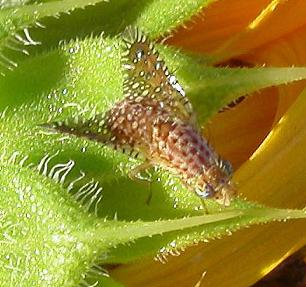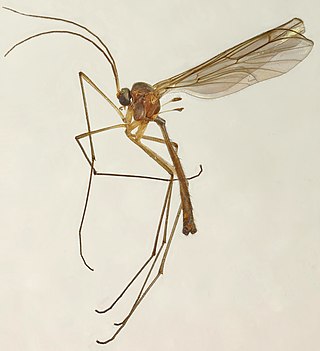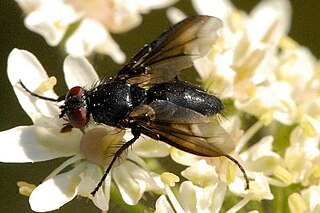
The Nematocera are a suborder of elongated flies with thin, segmented antennae and mostly aquatic larvae. This group is paraphyletic and contains all flies but species from suborder Brachycera, which includes more commonly known species such as the housefly or the common fruit fly. The equivalent clade to Nematocera is the whole Diptera, with Brachycera as a subclade. Families in Nematocera include mosquitoes, crane flies, gnats, black flies, and multiple families commonly known as midges. The Nematocera typically have fairly long, fine, finely-jointed antennae. In many species, such as most mosquitoes, the female antennae are more or less threadlike, but the males have spectacularly plumose antennae.

Paracantha is a genus of fruit flies in the family Tephritidae.

Sciaroidea is a superfamily in the infraorder Bibionomorpha. There are about 16 families and more than 15,000 described species in Sciaroidea. Most of its constituent families are various gnats.
Conactiodoria is a genus of flies in the family Tachinidae.
Palpozenillia is a genus of flies in the family Tachinidae.

Bolitophila is the sole living genus in the Bolitophilidae, a family of Diptera in the superfamily Sciaroidea, with around 40 Palaearctic and about 20 Nearctic species, and three species from the Oriental region (Taiwan). They are small (6–9 mm).

The Ditomyiidae are a small family of flies (Diptera).They are found worldwide, most species are found in the Australasian and Neotropical realms. There are only two genera in Europe Ditomyia Winnertz, 1846 and Symmerus Walker, 1848 Ditomyia is found in Central Europe Symmerus in Northern Europe Symmerus is endemic to the Palaearctic.
Allocotocera is a genus of flies in the family of Mycetophilidae. Two of the species are found in Europe.

Voriini is a tribe of flies in the family Tachinidae. More junior homonyms exist of Wagneria than any other animal genus name.

Polideini is a tribe of bristle flies in the family Tachinidae. The tribe is unusual for its diversity of hosts, including spiders, scorpions, and centipedes in addition to the usual insect larvae.

Pipunculinae is a subfamily of big-headed flies.
Monoclona is a genus of fungus gnats in the family Mycetophilidae. There are about 18 described species in Monoclona.
Probolaeus is a genus of long-beaked fungus gnats in the family Lygistorrhinidae.
Arrhynchus is a genus of small-headed flies in the family Acroceridae. It was formerly considered a synonym of Ocnaea, but was reinstated as a valid genus by Schlinger in 1968. It is endemic to Chile.
Nervijuncta is a genus of fungus gnats in the family Ditomyiidae.
Australosymmerus is a genus of fungus gnats in the family Ditomyiidae.

Mesembrinellidae is a family of Neotropical flies in the order Diptera, and formerly included in the Calliphoridae. There are 36 described species.

Mesembrinellinae is a subfamily of Neotropical flies in the order Diptera, and formerly included in the Calliphoridae. There are 33 described living species.

Eudorylini is a tribe of big-headed flies.

Sciophila fractinervis is a species of fungus gnat in the family Mycetophilidae.









